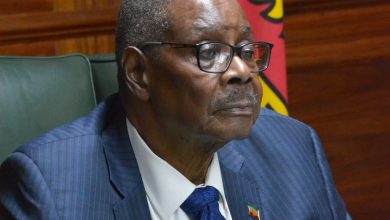MCCCI urges reforms, bemoans rising debt
Malawi Confederation of Chambers of Commerce and Industry (MCCCI) president Wisely Phiri says the country’s Industrialisation Policy requires complete overhaul to align with Malawi 2063 goals to attract investments.
Speaking during the opening of the 35th Malawi International Trade Fair at the Chichiri Trade Fair grounds in Blantyre yesterday, presided over by President Lazarus Chakwera, he said the policy overhaul will help start-ups that are facing tax and operational challenges and support industrial growth.

Said Phiri: “Incentives such as tax breaks, grants and land access are also essential to boost small and medium enterprises, economic diversification and job creation.
“We need a progressive tax regime to encourage compliance, formalise more businesses, expand the tax base and stimulate growth by reducing entry barriers for new enterprises.”
However, he asked Chakwera to intervene on the growing public debt, which he said is crowding out the private sector as businesses are meeting hurdles to access funding from commercial banks.
Reserve Bank of Malawi data shows that the public sector continues to dominate the credit market, having accessed K6 trillion against the private sector’s K1.5 trillion as at December 2024.
On the other hand, public debt stock has jumped to K16.19 trillion or 86.4 percent of the gross domestic product (GDP) as at September 2024, half the size of the 2025/26 National Budget projected at K8 trillion.
In the 2025/26 budget alone, interest payment is projected at K2.17 trillion, which is about half of the projected domestic revenue of K4.4 trillion.
In his address, Chakwera said the private sector is supposed to drive the economy, adding that the role of government is not to fight businesses, but to grow them.
He said: “For us in government, our job is to listen to the grievances of businesses and discuss with them on what needs to be done and do our part for the businesses to thrive.
“Our role is to engage banks on formulating policies that would help businesses access bank loans at cheaper rates. It is not on that businesses should only find cheaper loans from National Economic Empowerment Fund.”
On his part, Minister of Trade and Industry Vitumbiko Mumba said the increase in the number of exhibitors to 186 from 142 last year at a time Malawi is facing serious economic challenges, is a testament of a resilient nation that is working on its economy through industrialisation and trade.
He said the ministry is implementing a number of strategic interventions to support industrialisation and export growth, including Special Economic Zones, promotion of agro-processing and value addition and Buy Malawi Strategy.
Bantu Arts and Craft chief executive officer Edward Malunga, whose firm manufactures shoes, said while the previous fairs have helped him to secure new markets, this year is promising to be better.
“I have already secured orders for my shoes, especially the security boots and I am hopeful that by the end of the fair, the opportunities will be enormous,” she said.
Her counterpart, Alice Nayesa of Zaphama Enterprises, said she wants to secure new markets for her value-added agricultural products, including dried vegetables.
The fair comes at a time Malawi is still grappling to narrow the trade gap with National Statistical Office data showing that the country exports goods valued at roughly $1 billion (about K1.7 trillion) against imports at $3 billion (about K5.2 trillion), creating a negative trade balance.
The fair is being held under the theme ‘Promoting economic growth through private sector-led economic transformation’.





